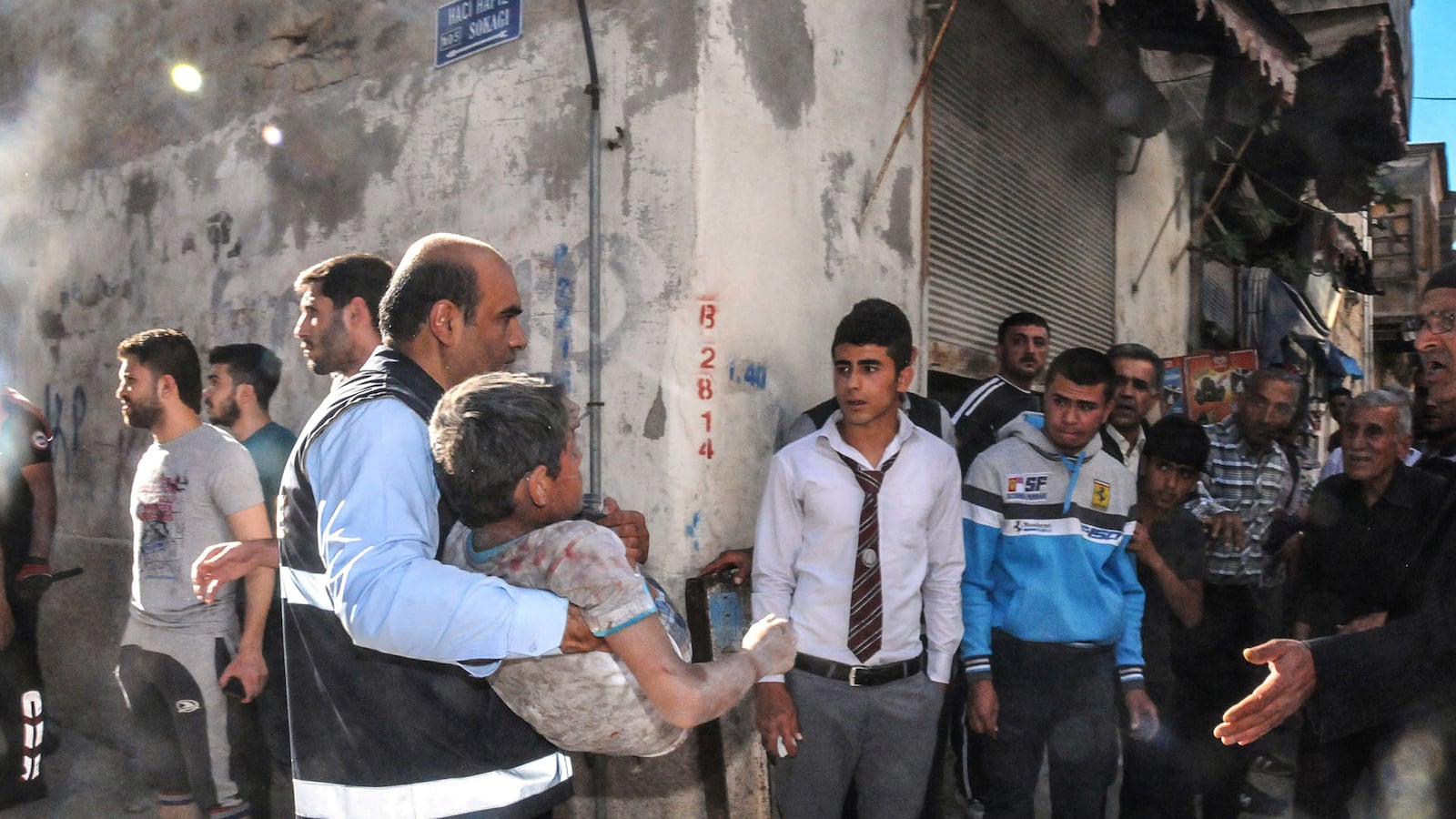KILIS, TURKEY — The Syrian orphanage stands empty, its rooftop littered with toys, blood and rubble. Last month, four children were killed here as they played—the girls in their fresh summer dresses, the boys frowning over a puzzle.
Yasmin, Tesnim, Muhammed and Mutasem are casualties of ISIS, a jihadist superpower which has seized territory across their homeland. But this orphanage was in Turkey, not Syria, and the children had seen it as a refuge.
Three miles from the Syrian border, the town of Kilis is in the terror group’s crosshairs. Since in mid-April, Katyusha rockets have landed almost daily, killing at least 20 people and wounding dozens more as part of a stepped-up war against the Turkish state.
“We told our children they would be safe here. Now they think they are back in Syria,” said Abdul Ghani Alshawakh, director of the Fatih Sultan Mehmet organization which runs the orphanage and women’s shelter where the four children died. “Europe is sending us back here by the boatload. Do they think Syrian blood is cheap?”
As Europe closes its borders to most refugees, a new agreement between Brussels and Ankara will see many returned to Turkey on the grounds that it is safe. In Kilis, where Syrians now outnumber Turks, these newcomers say it is anything but.
The attacks come as Turkey intensifies its war against ISIS, tightening control of its border and backing preferred rebel groups who are fighting the militants in northern Syria. In response, ISIS has escalated sporadic bomb attacks on Turkish territory into daily rocket salvo—sometimes as many as seven—as well as a May Day car bomb in the southern city of Gaziantep.
When the rocket smashed through the orphanage roof last month, Om Kheir, the mother of Tesnim, Muhammed and Mutasem, was approaching on foot. “I knew in that moment they were dead,” she said, clutching photograph of her children. “I felt their souls leave this world as I screamed. I hope they forgive me for bringing them to this town.”
Their journey to Turkey had been long and harrowing. They had lived for months in an open field, after fleeing the northern city of Azaz in 2012. Om Kheir’s husband, Bassem, has not been heard of since he was arrested early that year by forces loyal to President Bashar al-Assad. One report from a former cellmate suggested he had died from torture.
“The children lost their father, they lost their country, and then the war killed them in the one place I promised they’d be safe,” said Om Kheir.
In Kilis, where roughly 129,000 Syrians outnumber the 93,300 local Turks, the attacks have deepened tensions between the refugees and their host community. The influx had already strained local services, more than tripling pre-war levels of water consumption and waste collection, and shrinking the amount of green space per person from five square meters to just over one.
“Now the Turks say we have brought war to their homes as well. It’s getting harder to convince them that we are victims too,” said Mahmoud Ghazal, a former headteacher from Aleppo. As he spoke, the boom of another rocket—the third before midday—shattered the morning calm. Up ahead, two spindle-legged Syrian school girls bolted, losing rucksacks and shoes as they ran.
“So many people here are traumatized,” said Ghazal. “You see the fear in their eyes when the rockets land. They can’t escape it. They’re back in Aleppo.”
Kilis residents have appealed to Ankara for greater protection. “Rockets fall on our houses, shrapnel pieces rain on us, we are killed inside our homes, we are killed on the streets,” wrote a group of local business leaders in a recent newspaper spot.
Turkey said on Sunday that it had retaliated with cross-border shelling, killing 55 ISIS militants in northern Syria and taking out several rocket installations and vehicles. But experts say attacks are unlikely to be extinguished without clearing ISIS from the so-called ‘Manbij pocket,’ the last strip of territory it controls along the Turkish border.
The rockets are launched opportunistically off the back of pickup trucks and their firing mechanisms give off limited heat, evading detection by thermal imagery from circling drones.
“The rockets are a new phase in the [ISIS] war, and one in which the Turkish government has no answer for,” said Aaron Stein, a Resident Senior Fellow at the Atlantic Council’s Rafik Hariri Center for the Middle East. “Absent a significant military escalation, Turkey won't be able to stop the rocket fire.”
Disagreements between Turkey and the United States over how to clear the Manbij pocket have slowed attempts to push ISIS from the area. While Ankara is backing indigenous Arab forces to do the job, Washington prefers to use fighters mostly drawn from the Kurdish People’s Protection Units, a force the Turkish government describe as “terrorists.”
Up on the roof of the Kilis orphanage, reminders of the human cost of the Islamic State’s war lie scattered in every corner. The smell of flesh still lingers and on the very edge, where the rooftop meets the sky, lies a certificate for Muhammed, the youngest child. “For Syria’s best future scientist,” it reads. He had won first place.





